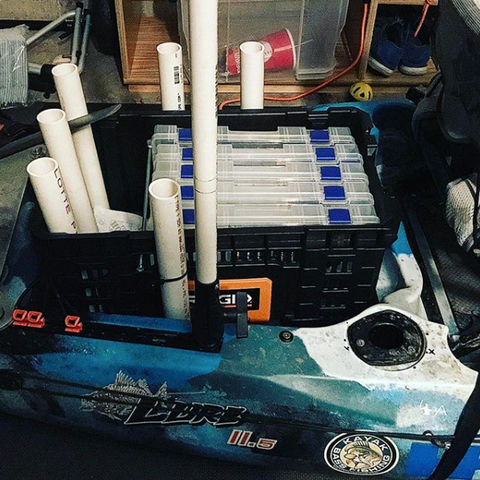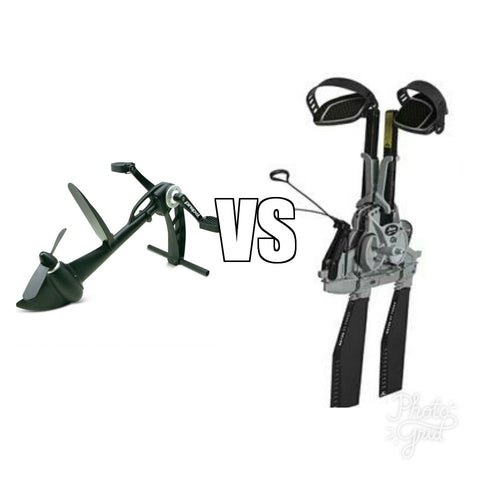
Guide For Buying A New Fishing Kayak For Kayak Fishing: 8 Things To Know Before Buying
Kayak Fishing And Eight Things To Consider When Buying A Kayak

Kayak Fishing (Photo Credit: HobiePolarized)
Kayak fishing has taken the fishing industry by storm. Many anglers are giving up the shore and boat line for kayaks. Kayak fishing is an excellent means for navigating the shallows and areas that boats can not reach. There honestly is something about catching a fish from the kayak that makes it so addicting. No matter if you are an avid saltwater fisherman or a freshwater angler, kayak fishing adds another element to being on the water and fishing. You use to see kayaks out on the water barely, and now they are everywhere. You can no longer walk into one of the big box hunting and fishing stores without seeing kayaks and kayak accessories. The new thing is to try to catch all the same fish you would typically target from a boat except now you do it from a kayak.
Because of the surge in kayak fishing sales, we have seen a drastic change in the way kayaks are made. Kayaks have come a long way in the last ten years, and honestly many of them are like small boats. Kayaks are way more stable than canoes and more comfortable to fish from with all of your gear. One reason many people are ditching the idea of getting a boat is that of how much they cost. You can get into an excellent kayak with $800 to 2,000 dollars. This is significantly less expensive than the traditionally powered fishing boats. Many of the inshore saltwater anglers have taken up kayak fishing because of their ability to fish skinny water.
Kayak companies have seen this trend and responded with the kayaks anglers want. Over the last few years, we have seen an explosion in the kayak community with kayak companies popping up everywhere. Anglers won when this happened because these companies always try to come out with the best new thing. Technology advances with companies in the mix and keeps the price point down with multiple large companies making the kayaks. There honestly is a kayak built for everything nowadays. No matter if you fish lakes or rivers up north or if you want to take it on the open water of the ocean for sailfish, there is a kayak for you. This is all great for anglers, but often with so many companies in the mix, the consumer can become confused. We want the most efficient kayak for fishing at the best price on the market. How do we tackle this head on and eliminate the confusion that the average angler will encounter when shopping for a new kayak?
One must determine what their needs are and what will help meet those needs. I look at it almost like car shopping. There are 100 different kinds of cars out there, but only one will meet all of your needs. We have come up with a guide that will help you when trying to buy a new kayak. There are seven things every angler must consider. These are Length, Stability, Storage, Keel, Space, Portability, and Anchor Capabilities. Allow us to go into more detail about each fishing kayak capability and need.
Kayak Buying Tip #1: Fishing Kayak Is All About The Length

Kayaks vary in sizes (Photo Credit: Oak Orchard Canoe)
One question I always get when people are trying to buy a new kayak is, "What is a good length to buy?" I always tell people that a fishing kayaks length is one of the essential aspects when shopping for a kayak. The length will often determine the performance of the kayak on the water. As an angler you should as your self, what type of water will I be fishing with this kayak? As a general rule, the longer the kayak, the harder it can be to maneuver. The shorter the kayak usually, the better it is at maneuverability, while the longer kayaks are more built for speed. This is important because if you are fishing open ocean or inshore areas with heavy currents, then a longer kayak will work better for you. If you are a lake or pond kayak fisherman then most of the time you need more maneuverability and should opt for a shorter kayak. Another thing one must consider is how big you are. The bigger you are, the bigger your kayak should be. Always keep that in mind.
Kayak Buying Tip #2: Stability Is Essential For A Fishing Kayak

Standing while fishing from the yak (Photo Credit: Old Town Canoes)
In my opinion, the next most critical thing one must look for in a new kayak is stability. If you feel like you are always going to fall over, then you will never want to go kayak fishing. In the beginning, kayak companies did not master the concept of stability. The kayaks that were first made could easily be tipped and losing all of your gear was a fear of many of the early kayak anglers. Since the kayak explosion happened kayak companies have started making kayaks the most stable they have ever been. Many of the modern kayaks you can stand on and fish. Unfortunately, as companies have begun making kayaks stable, they have lost some of the maneuverability. These are all things an angler must consider. Do you plan on standing to fish? Are you a big body person? The wider the kayak, the more stability it provides. You must figure out how much stability you will need to have a successful fishing trip. Often anglers who plan on trolling or have to cover a significant amount of water will opt for a more narrow kayak because they lack a little stability but are a lot easier to paddle.
Kayak Buying Tip #3: You Can Never Have Too Much Storage On A Kayak

Kayak storage for all fishing gear (Photo Credit: JC1SCastaway)
Nowadays there is a lure for every species of fish, a pole or reel for every type of fishing or an accessory whatever you may need out on the water. The market loves this because it expands the industry. Unfortunately, you have to have places to put all of your fishing gear when out on the water. This makes storage on your kayak so important. You do not want to leave any essential equipment behind because you could not fit it in your kayak. All kayaks are different and offer different amounts of storage. Some kayaks offer integrated storage and live wells to meet the need of anglers. Others have space above the hull that you can place an external milk crate to optimize storage. They will all be different but find one that offers all the storage you need whether its above hull storage or integrated storage. I suggest you write down everything you use on a fishing trip before you look. This will give you a better mental picture if everything fits on your yak.
Kayak Buying Tip #4 Keels Are A Must

Kayak Keel (Photo Credit: Pelican Sport)
The keel of a kayak is the plastic fin that is in the back that serves as the rudder for steering. Many of these keels can be integrated or retractable. This comes in handy when fishing the shallows, so you do not break off the keel. Kayaks also come without keels, but we would not recommend any. We think if you are in the market for a fishing kayak then you need a keel. This will allow you to maneuver into certain spots easier and let you direct the kayak.
Kayak Buying Tip #5: Portability Is Critical

Transporting fishing kayak in back of truck (Photo Credit: Scout.com)
As kayak companies keep advancing fishing kayaks, anglers must still shop for a kayak that is portable. If you purchase a kayak that is too big for one person to pick up, then you will never be able to use it by urself. Finding a yak that has stability and portability are essential nowadays. When researching for a new yak take into consideration the size and weight before buying. This is also important for transporting. Will the kayak fit into the back of a truck or will you have to get a separate trailer for it? Many kayak landings will require you to carry it some distance to put it in the water. A non-portable kayak could make putting in and taking out very difficult. Always remember that even out in the water you could get stuck and have to move the kayak, get one that is portable and easily moved. One of my favorite kayaks is the Hobie pro 14" but this kayak scores low on portability because fully rigged it can weight upwards of 140lbs. This is something that anglers should consider because if you plan to fish alone, then you need something you can transport alone.
Kayak Buying Tip #6: Electronics Are Great, So Make Sure There Is Room
Electronics on the yak (Photo Credit: Ram Mount)
Another thing that anglers often forget is the electronics needed on a kayak. Many anglers attach depth finders and fish finders on their yaks to help with their fishing needs. Always make sure there is room on the kayak to hook up whatever electronics you need. This will only make your kayak fishing experience that much better.
Kayak Buying Tip #7: Anchoring System

Kayak anchor system (Photo Credit: Texas Saltwater Fishing Magazine)
One thing that every angler must consider when buying a kayak is an anchoring system. An anchoring system is just as crucial as electronics on a fishing kayak. There are several different anchoring systems that you can have. The traditional method or an electronic anchoring system is something you must consider. Many would say this is something that is not a necessity, but when you are fishing places with high currents you need it. I always inspect a kayak to determine I can put the anchor system I want on it. This is one thing that still completes my kayak and makes it perfect for all the inshore kayak fishing I do.
Kayak Buying Tip #8: To Paddle Or To Pedal Drive The Fishing Kayak

Types of kayak pedal drives (Photo Credit: Kayak Bass League)
Since the beginning of kayaks, they have always required you to paddle to move around. This is always a challenge when trying to fish. Many of the kayak companies realized this and came out with a pedal drive system to propel the kayak through the water. This allows for you to move hands-free which allows you to fish as you are moving. Many of these pedal systems are so advanced that they collapse under the kayak or you can pull it up in skinny water. This has been a game changer in the kayak community and one of the reasons we have seen it explode in most recent years.
The kayak can be loads of fun for inshore fishing or freshwater fishing. It does require a decent level of physical fitness, but once you get in the saddle, you will never look back! Because of this, you should not let buying a new kayak stress you out. Enjoy the process and find what your heart is set on. If you have any questions or concerns, please leave a comment below or email us at [email protected]. Send us all your kayak pictures to be featured on our KayakFishingPics Instagram page. We hope this will give you a game plan for how to approach buying a new fishing kayak.


Comments
Leave a comment